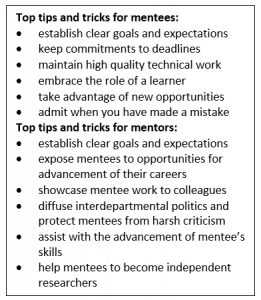 By Corrie Belanger, PhD Candidate, Hancock Lab
By Corrie Belanger, PhD Candidate, Hancock Lab
No matter what stage in your scientific career you are in, you can no doubt appreciate what it is like to be mentored and to mentor someone else. Though mentorship is a normal part of a career in science (as well as many other fields), it is often not clear if there is a right way to approach mentorship, and even less clear how to get the most out of your relationship with your mentor or mentee. This January, hosts Kayla and Sally from the STEM-centric podcast Double Shelix entered the world of mentorship in a recent interview with senior graduate student, Julea Vlassakis. As a PhD in the Amy Hertz lab at UC Berkley and previously a biophysicist at Harvard, Julea has eight years of mentoring experience and joined Kayla and Sally to answer the question: What is it like to be a good mentor and, in turn, to be a good mentee in order to get the most out of your scientific career, whether you are an undergraduate, graduate student, or postdoctoral fellow?
In the episode, titled Next Level Mentorship for Mentors and Mentees, Julea touches on topics such as what to look for in a supervisor or a trainee, what the two can do for each other, and why it is important to cultivate this relationship between the two parties. She also stresses the importance of an open dialogue between mentors and mentees. Julea suggests that no matter where you are in your PhD, it is not too late to start openly communicating scientific and professional goals with your supervisor. This ensures that you know what each of you wants out of your relationship, and whether or not your goals are being met.
From the perspective of the mentees, Julea highlights the importance of having professional relationships with official and unofficial mentors for the simple reason that everyone in academia has to go through graduate school, and many will face the same challenges and require similar skills. Julea encourages mentees to first take advantage of any skills mentors have to teach them, instead of struggling to “reinvent the wheel in terms of all the experiences that come up day to day in the lab”. This is crucial for successfully completing tasks within a timely manner. The second reason Julea thinks mentors are really important in graduate school is that a mentor can do many things for you that you cannot do for yourself. These include advocating for yourself and your research, or meeting certain colleagues within your workplace, or even networking for future career opportunities.
From the perspective of the mentors, there are also benefits to creating a successful relationship with mentees. Julea highlights the value of having experience mentoring undergraduate or graduate students, which helps you learn a lot about different aspects of your research, allows you to become a better teacher of technical skills, and gives back to the science community.
To summarize her vast knowledge and experience in mentorship, Julea finishes off her interview with the top tips and tricks for mentors and mentees accumulated from various engaging sources, as well as her own experience (see box on right).
Whether you are a graduate student, undergrad, or postdoc, the valuable tips shared by Julea on Double-Shelix should be a great start to getting you ready for mentorship from either end of the spectrum. This episode will give you the tools to assess whether your mentorship relationships are meeting your expectations and the expectations of other parties involved. To learn more about Julea Vlassakis’ advice on mentorship, the entire episode, as well as other interesting episodes, can be found at doubleshelix.com.


